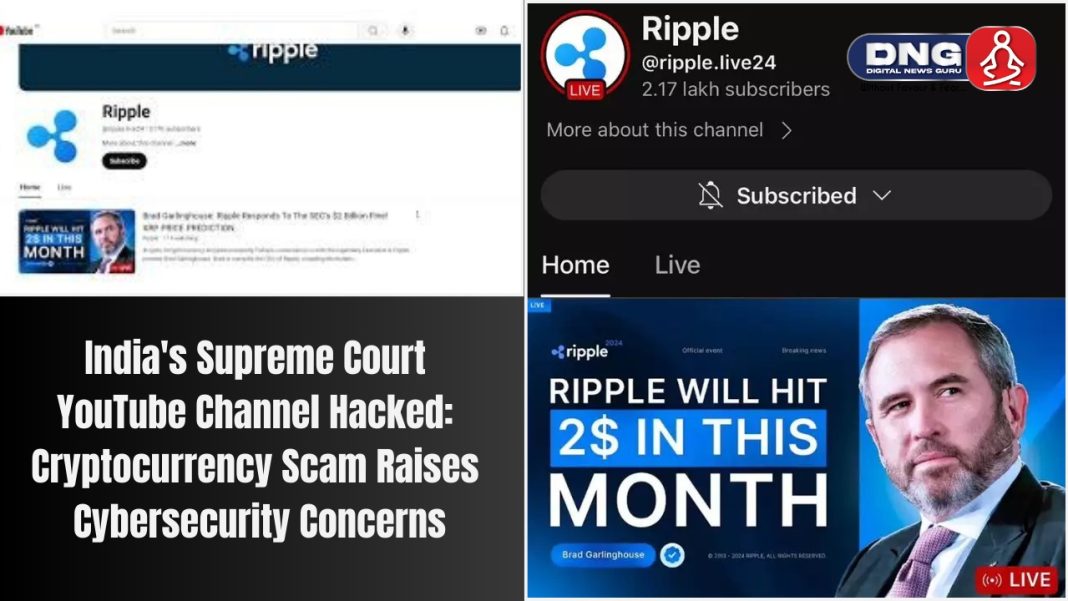DIGITAL NEWS GURU DELHI DESK:
India’s Supreme Court YouTube Channel Hacked: Cryptocurrency Scam Raises Cybersecurity Concerns
On September 20, 2024, the Supreme Court of India’s official YouTube channel was hacked, marking a significant incident in the realm of cybercrime targeting high-profile digital platforms.
This breach has raised numerous questions about the security of governmental digital properties and the increasing sophistication of cyber-attacks globally.
Incident Details

The Supreme Court’s YouTube channel, typically used for official communications and dissemination of key information to the public, was compromised early in the day. Reports suggest that the channel, which had a significant subscriber base, was defaced and began promoting cryptocurrency-related content. Hackers typically exploit high-traffic platforms for such purposes to maximize visibility, often rerouting users to dubious external links or encouraging investments in fraudulent schemes.
The breach was quickly noticed, and the channel was taken down to prevent further spread of misleading content. The court’s IT team responded by shutting down the channel and initiated steps to restore access. A statement was issued by the Supreme Court’s technical staff, assuring that efforts were underway to resolve the issue and reinstate the channel’s services.
Potential Implications
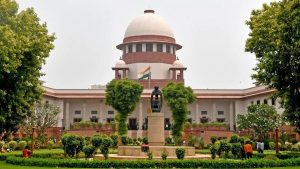
While this may seem like an isolated incident, it underscores several critical issues. First, the targeting of India’s highest judicial authority’s official channel illustrates that no entity is immune to cyber-attacks, regardless of its stature or significance. This is a wake-up call for governmental institutions, which often become prime targets for hackers aiming to make a high-profile impact.
Moreover, the nature of the content displayed post-hack — cryptocurrency promotions — is part of a growing trend in cybercrime. Hackers frequently capitalize on the rising popularity and relative anonymity of cryptocurrencies, luring unsuspecting viewers into scams. A government channel inadvertently promoting such content not only endangers its credibility but also exposes its audience, including legal professionals, academics, and the general public, to potential financial harm.
Rise of Cyberattacks on Government Entities
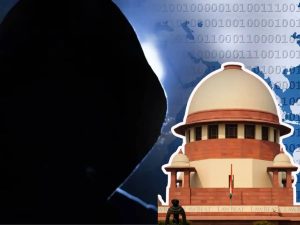
The attack on the Supreme Court’s YouTube channel is not an isolated case. Cyberattacks on government agencies and high-profile institutions have been on the rise globally. In recent years, hackers have targeted sensitive institutions, from electoral bodies to healthcare systems, disrupting services and leaking classified data. In India, this breach follows a string of cybersecurity incidents involving various government platforms, raising concerns about the nation’s cybersecurity infrastructure.
India has experienced other high-profile hacking incidents, such as the breach of the National Informatics Centre’s (NIC) systems in 2021. Additionally, hackers targeted the Kudankulam Nuclear Power Plant in Tamil Nadu, demonstrating that cyberattacks can extend beyond data theft and include critical infrastructure sabotage.
Given the frequency of these incidents, the hack of the Supreme Court’s YouTube channel shines a spotlight on the vulnerabilities in government cybersecurity, particularly on platforms that are critical for public communication. The importance of securing these systems has never been more apparent.
Response and Restoration
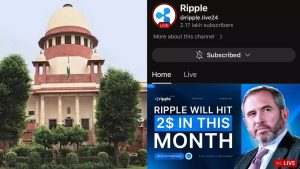
The Supreme Court’s technical team acted swiftly to take the channel offline and address the breach. As of the latest updates, work was underway to fully restore the channel and its content. Although the breach was seemingly resolved within hours, it has triggered discussions on the robustness of cybersecurity protocols in place for government-managed platforms.
The government has previously launched initiatives aimed at strengthening cybersecurity. The National Cyber Security Strategy 2021, for instance, proposed measures to bolster defense mechanisms against cyberattacks, including securing digital platforms, strengthening public-private partnerships, and promoting awareness around cyber hygiene. However, the breach of the Supreme Court’s YouTube channel highlights the need for continuous upgrades and more stringent security protocols to prevent future incidents.
Legal and Institutional Repercussions
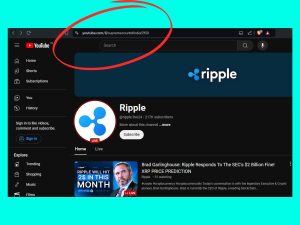
This hacking incident might also lead to legal implications. India’s Information Technology Act, 2000, and subsequent amendments under the IT (Amendment) Act, 2008, include provisions to tackle cybercrime, covering offenses such as hacking, identity theft, and phishing. Depending on the extent of the breach and the identity of the hackers, legal action could follow, although tracing the perpetrators of such attacks can be notoriously difficult due to the use of anonymizing tools and international networks.
The breach also has institutional ramifications, particularly regarding the trust and credibility of official channels. Platforms like the Supreme Court’s YouTube account serve as crucial touchpoints for disseminating legal information, and a breach of this nature can create doubts about the reliability of these sources. Ensuring that such incidents do not recur is essential for maintaining public trust.
Strengthening Cybersecurity Measures
The Supreme Court hack should act as a catalyst for revisiting India’s cybersecurity policies. Strengthening cybersecurity infrastructure for public institutions requires a multifaceted approach, combining cutting-edge technology, robust encryption, regular audits, and enhanced awareness among employees managing these platforms. Training programs on cyber hygiene and prompt incident reporting mechanisms are essential to detect vulnerabilities early and respond to breaches swiftly.
Moreover, global cooperation is crucial in countering cross-border cybercrimes. As hackers often operate from various jurisdictions, it is vital for India to collaborate with international law enforcement agencies, such as Interpol, to track down cybercriminals operating beyond its borders.
Conclusion
The hacking of the Supreme Court of India’s YouTube channel serves as a stark reminder of the persistent threat posed by cybercriminals. It highlights the vulnerabilities in digital infrastructure, even for institutions as prestigious as the Supreme Court. Moving forward, it is essential that governmental entities invest in stronger cybersecurity measures, ensure regular audits, and foster greater public-private partnerships to protect their digital assets and maintain the trust of the people they serve. The incident also reaffirms the importance of remaining vigilant in an increasingly digital world, where cyber-attacks are becoming more frequent and more sophisticated.
YOU MAY ALSO READ: Cracks Appear in Taj Mahal: Spark Concerns After Heavy Rains in Agra



